Language never stands still. In 2025, slang continues to evolve faster than ever, especially through online conversations, music, and social media culture.
One slang word that has stayed relevant but continues to gain new layers of meaning is “bunk.”
At first glance, “bunk” might seem simple, but in slang, it carries multiple connotations—from describing something as false or worthless to casually saying someone skipped class.
If you’ve seen it in texts, TikToks, or memes, you might wonder: What does “bunk” really mean in slang today?
This article explores the full meaning of “bunk” in slang (2025 edition)—covering its roots, modern uses, tone differences, and examples to help you use it naturally in conversations.
What Does “Bunk” Mean in Slang?
In modern slang, “bunk” usually refers to something false, unbelievable, worthless, or disappointing. Depending on the context, it can also mean skipping class or calling something low-quality.
For example:
- “That story he told was total bunk.” → nonsense, untrue
- “We’re gonna bunk class today.” → skip school or class
- “This game update is bunk.” → worthless, disappointing
Origins of “Bunk”
The slang “bunk” has roots in American English. It originated in the late 1800s from the word “bunkum,” which referred to meaningless talk or nonsense. Over time, “bunkum” shortened to “bunk,” taking on a sharper, slangier tone.
By the mid-20th century, “bunk” was widely used to dismiss lies or exaggerations. In the 2000s and 2010s, younger generations adopted it into school slang (like “bunking class”), and by 2025, it remains flexible with multiple meanings depending on culture and context.
Modern Interpretations of “Bunk” in 2025
Here are the key meanings of “bunk” in today’s slang:
- Nonsense or Lies – Used to dismiss false claims or exaggerations.
“That conspiracy theory is just bunk.” - Worthless or Low Quality – To describe something disappointing or poor in value.
“This Wi-Fi connection is bunk.” - Skipping Class/Work – Popular among students and sometimes employees.
“Let’s bunk the meeting and grab coffee instead.” - Exaggeration Check – When someone is overhyping something.
“Bro, that’s bunk. No way it happened like that.”
Tone & Context: When to Use “Bunk”
Understanding tone is critical in slang. Using “bunk” can come off as casual, dismissive, or humorous depending on delivery.
- Casual Conversations: Works naturally with friends.
- Professional Settings: Avoid using “bunk” in formal communication; it may sound unprofessional.
- Humorous/Joking: Great for playful banter online.
- Texting/Chats: Often shortened or used directly to dismiss something.
Polite, Professional & Casual Alternatives to “Bunk”
If “bunk” feels too casual or harsh, you can swap it with alternatives depending on the tone:
- Polite Alternatives: misleading, untrue, exaggerated.
- Professional Alternatives: inaccurate, unreliable, invalid.
- Casual Alternatives: bogus, fake, cap, nonsense.
10 Best Examples of “Bunk” in 2025 Slang
Here are 10 natural, modern examples showing how people actually use “bunk” today:
- “That excuse is pure bunk—just tell me the truth.” (calling out a lie)
- “We decided to bunk class and hang out at the café.” (skipping school)
- “This new app is bunk. It crashes every time.” (disappointment in quality)
- “Don’t feed me that bunk about working late—I saw your story.” (dismissing excuses)
- “The rumors online are mostly bunk.” (false information)
- “We bunked the meeting and went for pizza instead.” (casual skipping at work)
- “That movie was bunk compared to the hype.” (overhyped, underdelivered)
- “He’s always talking bunk to impress people.” (empty, exaggerated talk)
- “The deal looked good, but the terms were bunk.” (worthless or deceptive)
- “Stop spreading bunk, nobody believes it.” (calling out falsehoods)
How to Choose the Right Alternative
The trick is knowing when to use “bunk” vs. alternatives:
- Friends/Peers: Use “bunk” freely—it’s casual and fun.
- School/Work Settings: Swap with “bogus,” “false,” or “unreliable.”
- Academic/Professional Writing: Stick with “invalid” or “misleading.”
- Online Debates/Memes: “Bunk” works well with humor and sarcasm.
Final Thoughts
In 2025, “bunk” remains a versatile slang term that bridges casual chats, online culture, and student life. Whether you’re dismissing lies, calling out low-quality stuff, or joking about skipping responsibilities, “bunk” gets the point across quickly.
However, context matters. While it’s perfect for informal conversations, it doesn’t belong in professional communication. If you know when and how to use it, you’ll sound natural and up-to-date with modern English slang.
So next time you hear someone say something unbelievable or low-value, you know what to call it: “bunk.”





